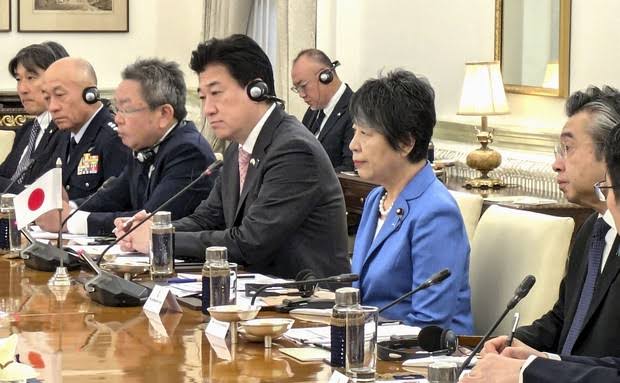India and Japan agree to boost cooperation on space, cybersecurity

Japanese Foreign Minister Yoko Kamikawa (2nd from right) and Defence Minister Minoru Kihara (4th from left) attend “two-plus-two” security talks in New Delhi on Aug. 20, 2024
India and Japan agreed during security talks to deepen cooperation in areas of outer space and cyber, while signalling their intention to accelerate discussions toward a plan for Tokyo to export naval communication antennas for Indian warships.
In a joint statement issued after “two-plus-two” talks involving the foreign and defence ministers of the two countries in New Delhi, it was also decided a 2008 declaration on security cooperation would be updated, with its signing expected when Indian Prime Minister Narendra Modi visits Japan, possibly by the year-end.
Japanese Foreign Minister Yoko Kamikawa and Defence Minister Minoru Kihara met with their Indian counterparts Shri Subrahmanyam Jaishankar and Shri Rajnath Singh in the two governments’ third “two-plus-two” talks since their launch in November 2019.
The gathering took place as the two countries have been ramping up security cooperation in the Indo-Pacific region. Japan has also been seeking to reinforce defence capabilities in so-called new domains such as space and cyber, and working together with like-minded countries in those fields.
In the joint statement, the two countries called for the “peaceful settlement of disputes without resorting to the threat or use of force” and “emphasized the need for all countries to refrain from any attempt to unilaterally change the status quo.”
The ministers also agreed to enhance their commitment to the Quad, a group of four major Indo-Pacific democracies also involving the United States and Australia and widely seen as a counterweight to China’s clout in the region. They also agreed to continue to hold exercises among the defence forces of the two countries as well as with other Quad members.
As for the transfer plan for the communication antennas known as Unicorn, which are similar to those installed on a new Japanese Maritime Self-Defence Force destroyer, it would, if realized, be the first such case under a Japan-India agreement on defence equipment and technology transfer signed in 2015.
Citing the progress made on the issue, the ministers “concurred on accelerating future cooperation in defence equipment and technology,” according to the joint statement.
The four ministers, meanwhile, said the plan to revise the 2008 Joint Declaration on Security Cooperation is intended to “reflect contemporary priorities and be responsive to contemporary security challenges” facing the two countries.
The document calls for concerted efforts in areas such as counterterrorism and nuclear non-proliferation.
In recent years, Japan and India have been drawn closer under a shared vision of realizing “a free and open Indo-Pacific.”
Japan has seen Chinese coast guard vessels repeatedly enter its waters around the Tokyo-controlled, Beijing-claimed Senkaku Islands in the East China Sea, while India has a longtime territorial dispute with China in a Himalayan border area.
India has also been increasing its presence as a leading power among emerging and developing economies, collectively dubbed the Global South, and Japanese Prime Minister Fumio Kishida’s government has emphasized relations with them.
India is also a member of the BRICS forum involving Brazil, Russia, China and South Africa, and has maintained friendly relations with Moscow, a key arms supplier for New Delhi, even after the launch of its invasion of Ukraine in February 2022.




